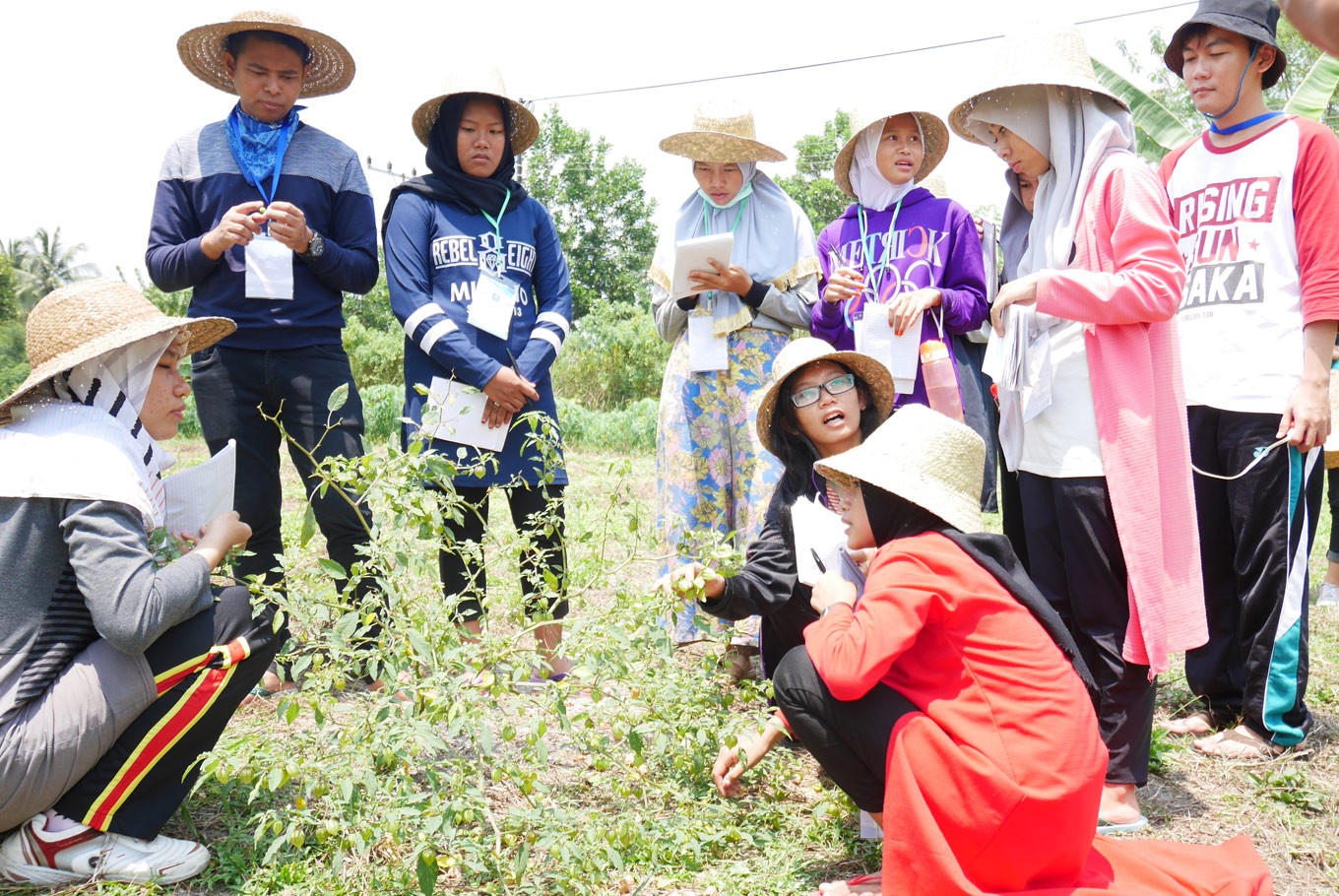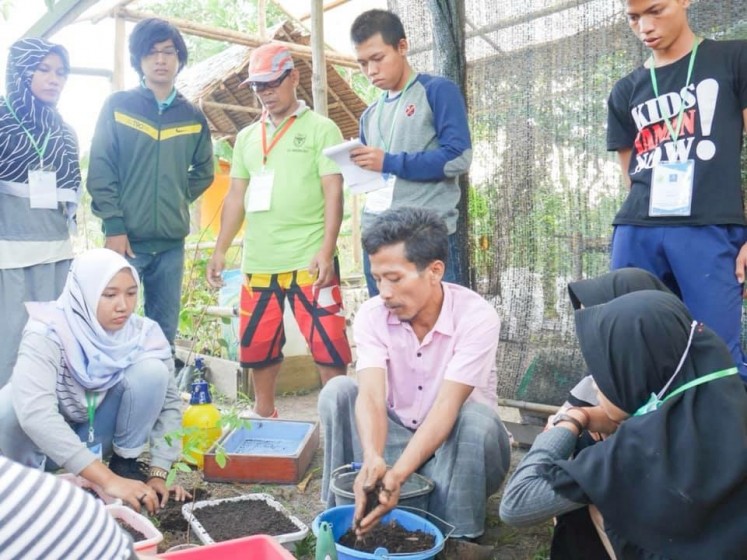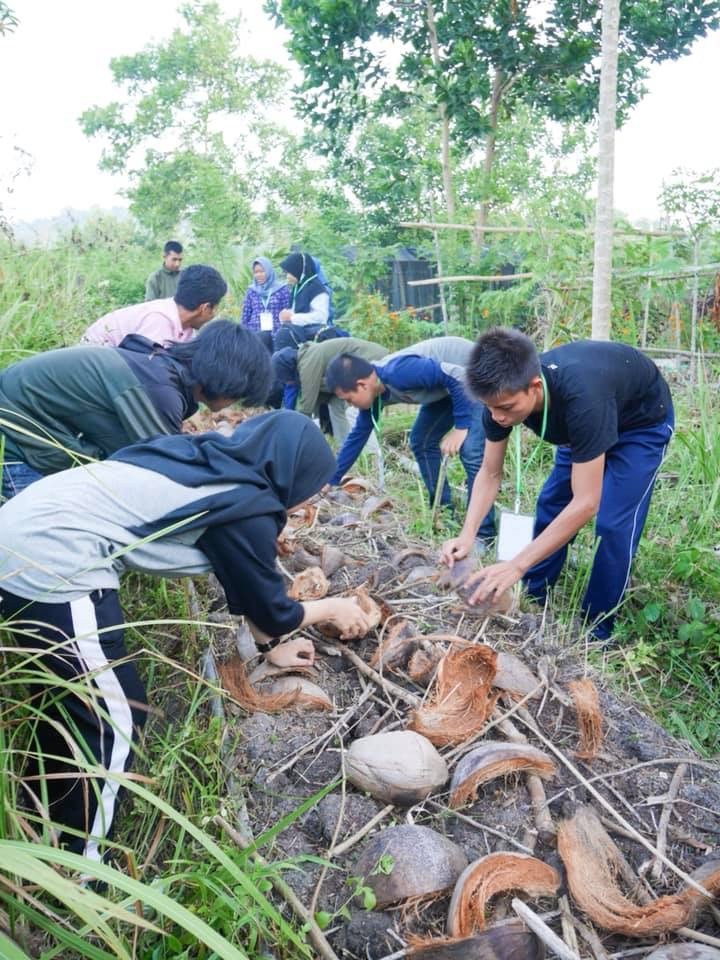Popular Reads
Top Results
Can't find what you're looking for?
View all search resultsPopular Reads
Top Results
Can't find what you're looking for?
View all search resultsRe-introducing farming to the young people in Borneo
Little is spoken about how these extractive industries evicted local communities and eroded the Dayak livelihoods, cultures and traditions embedded in the forests.
Change text size
Gift Premium Articles
to Anyone
C
entral Kalimantan has been subject to global attention for decades especially for its tropical rainforest and rich biodiversity. Much of the news has concentrated on its forests are being cut and degraded for timber, palm oil, pulp, rubber and minerals, resulting in the extinction of endemic animals such as the orangutan and hornbill; and raging forest and peat fires during the dry season.
Unfortunately, little is spoken about how these extractive industries evicted local communities and eroded the Dayak livelihoods, cultures and traditions embedded in the forests.
In the past four years, I have seen an increasing number of young Dayaks in Central Kalimantan campaign to protect and reconnect with their indigenous culture and land. Over the years, these young people have united in organized movements to boldly raise their collective voices to the government and international community.
The celebration of International Day of the World's Indigenous Peoples every August 9 has become an annual momentum to highlight their struggles and gain wider support. Marching on city streets in traditional outfits, dancing traditional dances, with huge banners protesting palm oil, mining, and timber corporations, these movements proudly show their indigenous identity.
Yet some of us sometimes join forefront of such movements without truly understanding what we are fighting for or fighting for values we ourselves do not embrace. Fighting against palm oil corporations while continuing to buy their products reflect our dependence on the convenient modern lifestyle sustained by the industry.
In fact, there is so much we can do to resist the corporate penetration into our daily lives. One example is by reconnecting with farming to grow and make our own food or simply by buying local produce from small-scale farmers. I do not mean to undermine the complexity of the forestry issues, but rather look at how our lifestyles have been so disconnected from our tradition and cultures. I am also not saying we have to completely resist modernization, but rather being selective and do not forget our roots. For instance we face loss of intergenerational knowledge on farming amidst a rapidly-modernizing society.
In rural Indonesia, especially Kalimantan, we have fewer local farmers with the ability and expertise to produce food at adequate levels. (Courtesy of Randi Julian Miranda/File)In rural Indonesia, especially Kalimantan, we have fewer local farmers with the ability and expertise to produce food at adequate levels. As a result, the majority of population relies heavily on food supply from other regions like Java and also imported products. The prices of these products, unfortunately, are often higher than the locally-produced ones and unaffordable to many. Kalimantan used to have a very strong and independent food security and farming was part of the population’s identity. One cause to this problem is poor transfer of skills and knowledge to subsequent generations; young people today rarely or never engage in farming.
In an effort to foster more interest in farming and reconnect young people with their ancestors’ traditions and cultures, on Sept. 13-16, 2018 we held agricultural training activities in Tangkiling, Central Kalimantan. It was intensive training on sustainable agriculture inspired by the Dayak wisdom and regenerative approach of permaculture, or efforts to design an agricultural system based on patterns observed in the ecosystem.
This program is under the project called "Bringing farming back to the village community in Borneo" (BRAVO). BRAVO aims to re-introduce farming knowledge to young people in Central Kalimantan to preserve cultures and ensure local food security.
Today, many people in Central Kalimantan complain they cannot buy food despite available land. This shows a changing value of land; people no longer see land as a source of life or life itself -- a philosophy of the Dayak that seems to be forgotten. This means our relationship with land needs to be re-defined by reconnecting with our ancestral values and practices.
Increasing number of young Dayaks in Central Kalimantan campaign to protect and reconnect with their indigenous culture and land. (Courtesy of Randi Julian Miranda/File)The training participants consisted of 20 young people from across Central Kalimantan. The program is funded by the Student Engagement Grant Program of the University of Melbourne and works with local organizations such as Permakultur Kalimantan, HandepHaruei and RanselBuku and HandepHaruei. The latter is an agriculture-based startup dedicated to produce and preserve local and forest-based produce, such as fruits and vegetables and herbs and spices.
The participants learned about local traditions and culture related to agriculture, redefined the profession of farmers, regenerative agricultures, composting and the importance of local food security and climate change. They also had the opportunity to do field practice. The program hopes to help raise awareness of the young generation about local wisdom, food security, environmental problems, waste management and sustainable agriculture.
Upon the completion of the training, the participants helped to establish the Central Kalimantan Young Farmers Community. This community will work in two groups on two demonstration plots, in Petuk Katimpun village and Palangkaraya city.
Preserving indigenous culture and traditions is not only about preserving languages, outfits and dances; it goes beyond the physical or materialism. Such traditions should eventually be deeply enmeshed in values and practices that we often forget. Thus, reconnecting the old and young generation is a crucial first step to foster a sense of pride and belonging to our forgotten culture and traditions amidst a rapidly-globalizing world.
***
The writer has extensive experience working in forest conservation, community empowerment and sustainable development. He is undertaking his postgraduate study in sustainable development at the University of Melbourne, Australia. He founded the HandepHaruei,an agriculture-based social enterprise in Central Kalimantan, dedicated to producing, preserving and creating added value to locally-grown and forest-based produce to create a locally-sensitive economic development.












